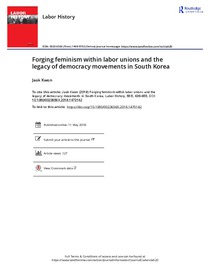Forging feminism within labor unions and the legacy of democracy movements in South Korea

2018
59
5
Oct.
639-655
trade unionism ; gender ; feminist movement ; social movement
Trade unionism
https://doi.org/10.1080/0023656X.2018.1470142
English
Bibliogr.
"Although most scholarship stresses that ‘male regular worker-centeredness' is a trait of mainstream Korean labor unions, the specific reasons why feminism has failed to spread within Korean unionism have not been clarified. In order to answer this question, this article focuses on the entangled interrelations of feminism with broader social movements, maintaining that the historical legacy of the victory of the 1987 Great Worker Struggle – led by male workers from the heavy and chemical industries – is still a powerful factor in discouraging the spread of feminism, even though a fundamental transformation in the nature of Korean labor unions from being primarily class conscious to economistic has taken place. This article also highlights that Korean women's movements have raised little criticism against the gender-blindness of labor unionism largely because Korean labor unions have been positioned as a ‘moral force' in bringing about democratization. Furthermore, I stress that conflict between old feminists (socialist feminism) and young feminists (radical feminism), who tend to reflect on the dichotomous relations between gender and/or class, has actually been counterproductive to the proliferation of feminism within Korean labor unions."
Digital
The ETUI is co-funded by the European Union. Views and opinions expressed are however those of the author(s) only and do not necessarily reflect those of the European Union or the ETUI.